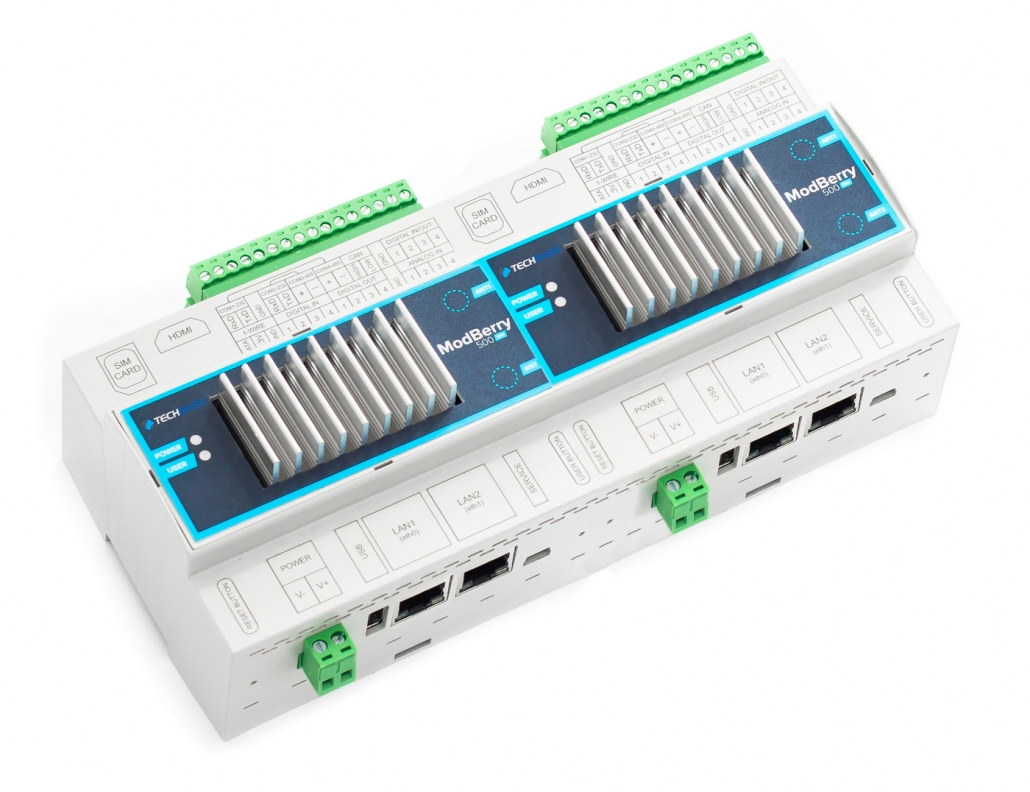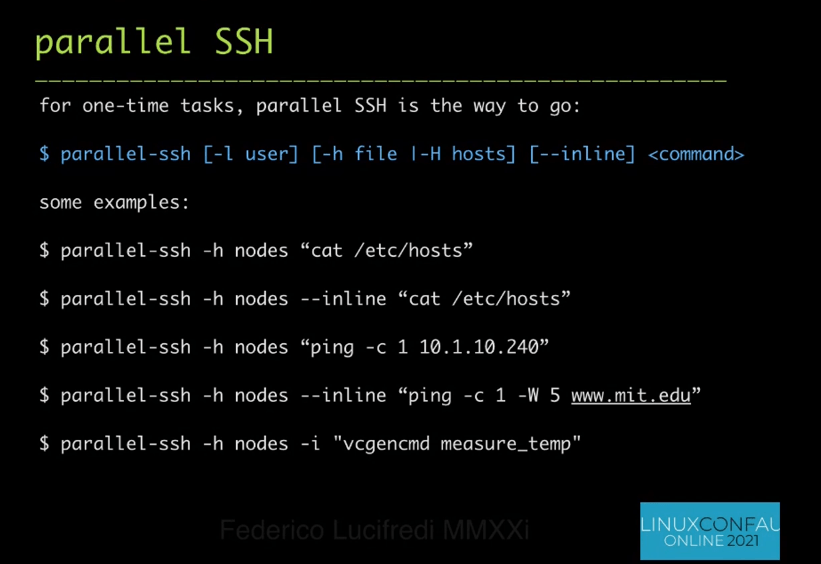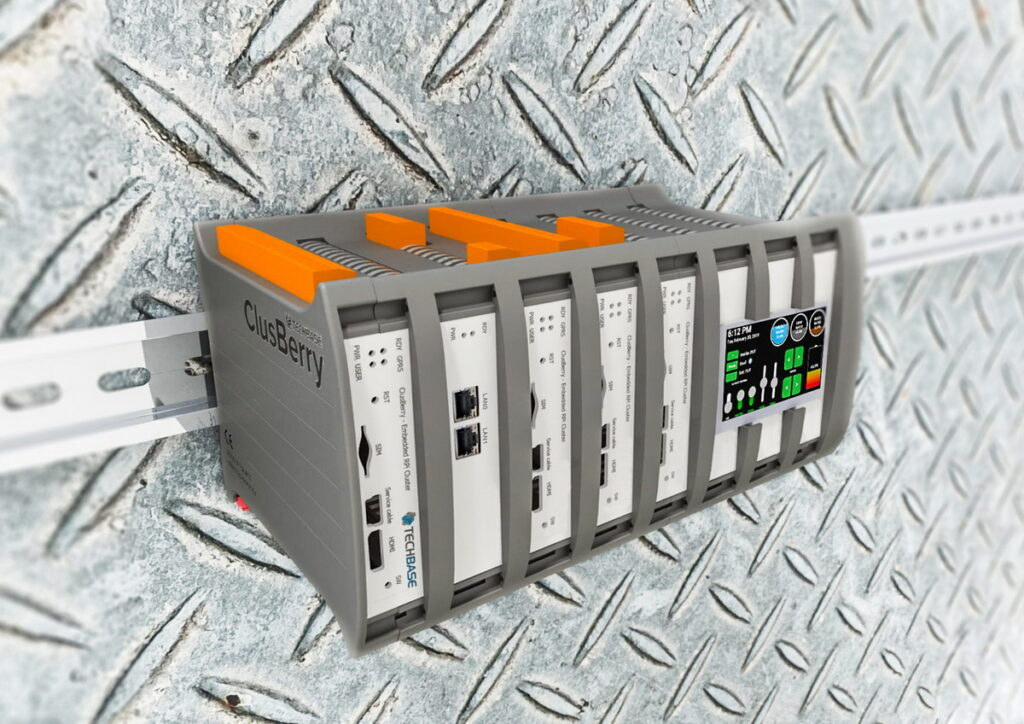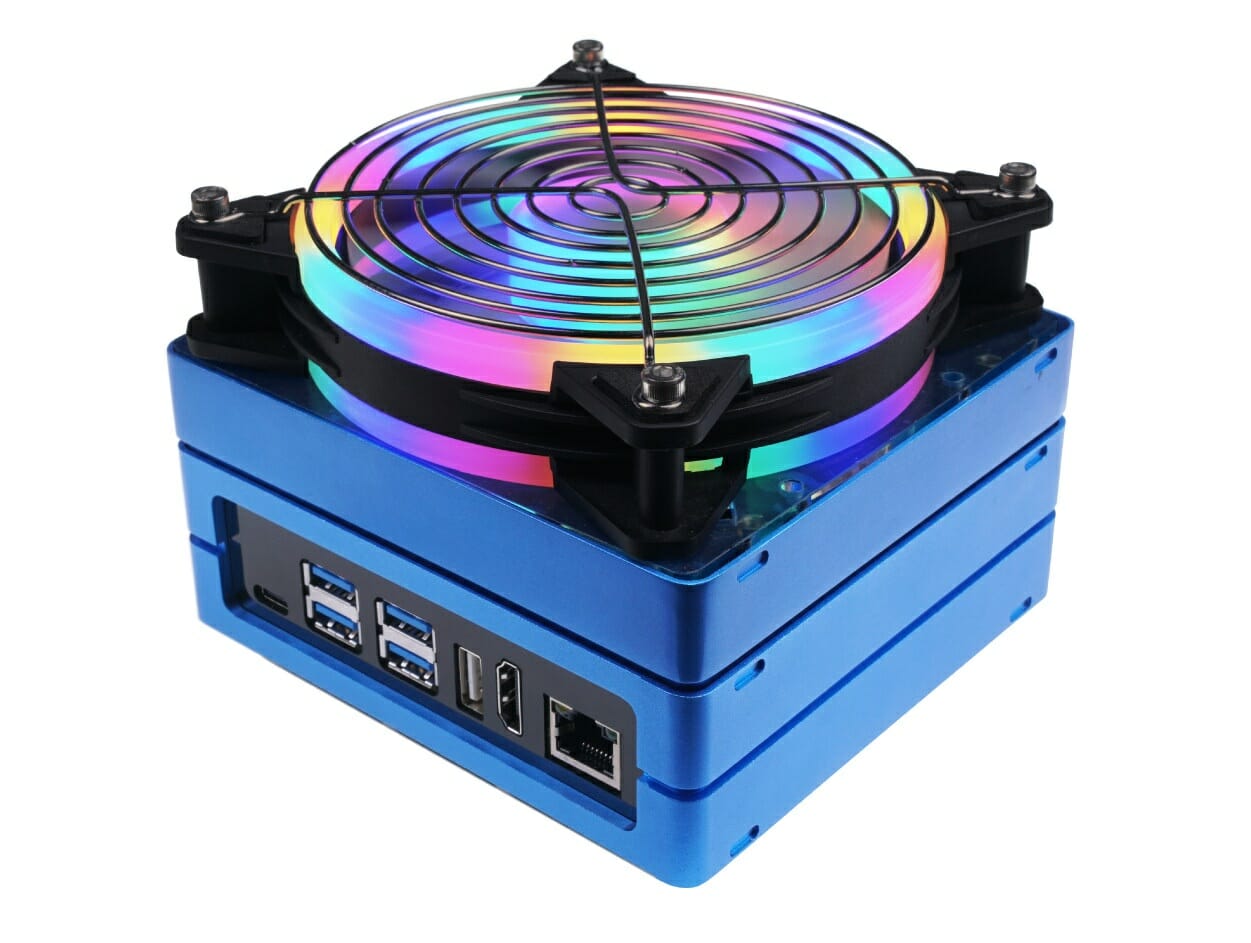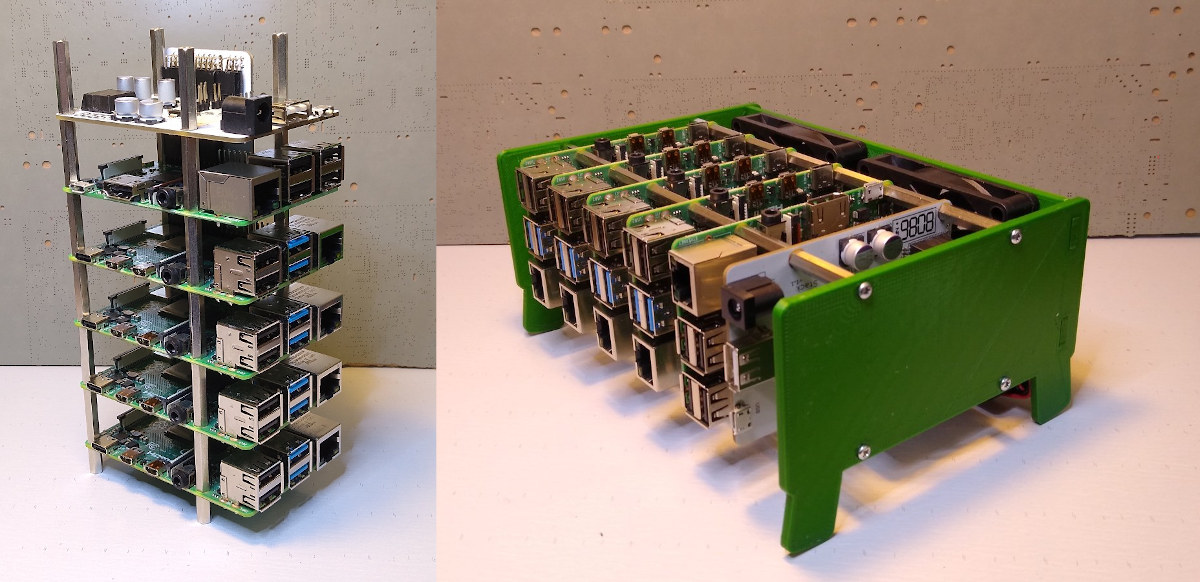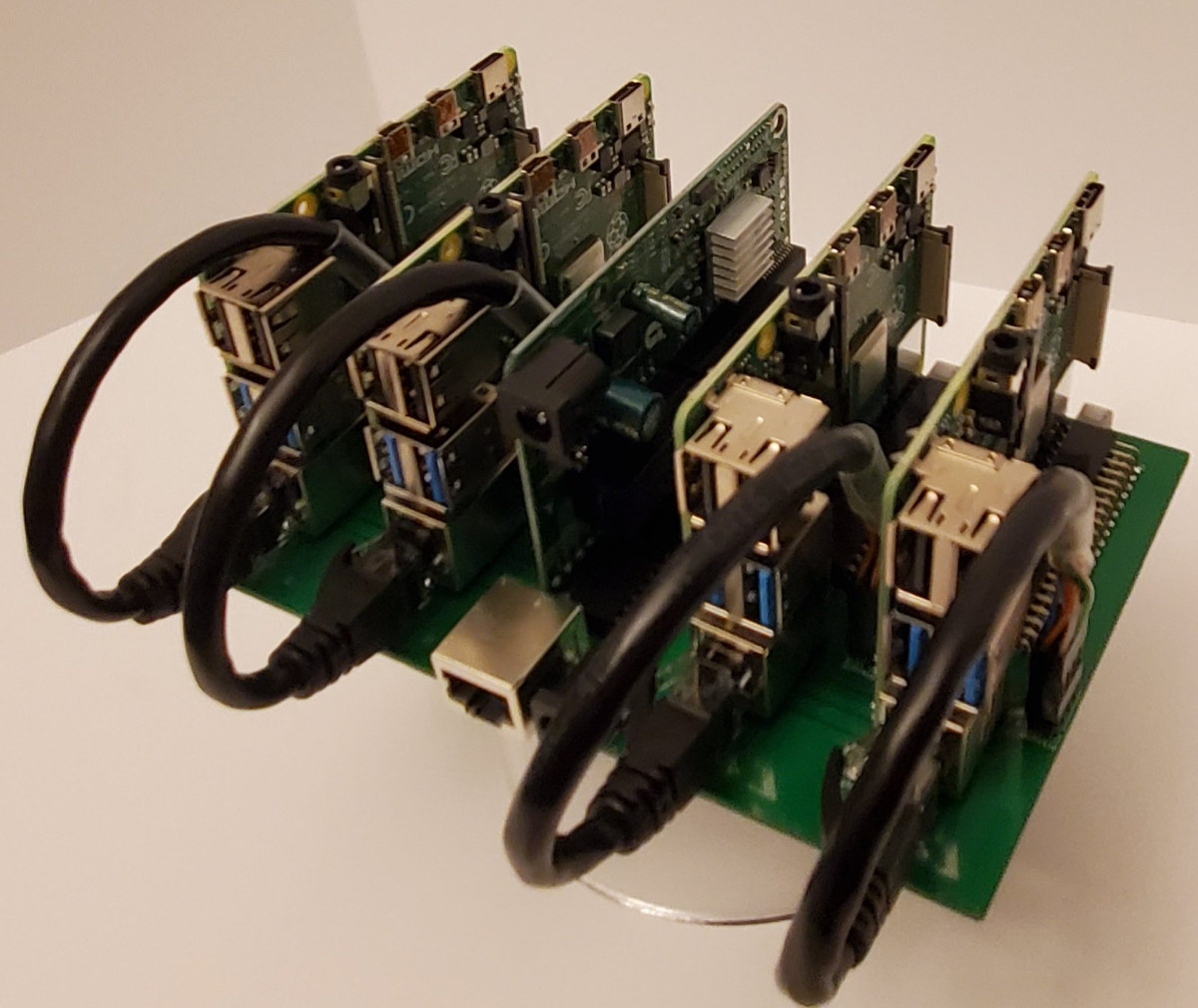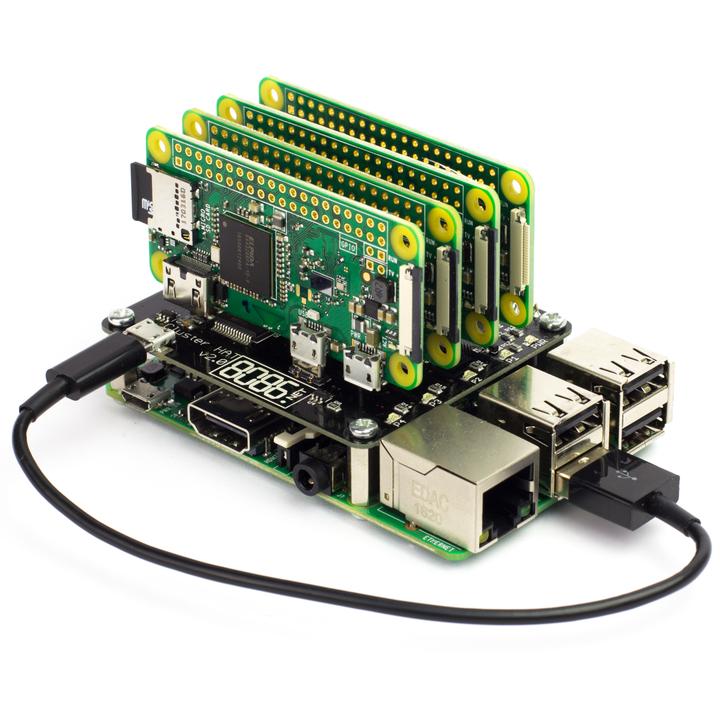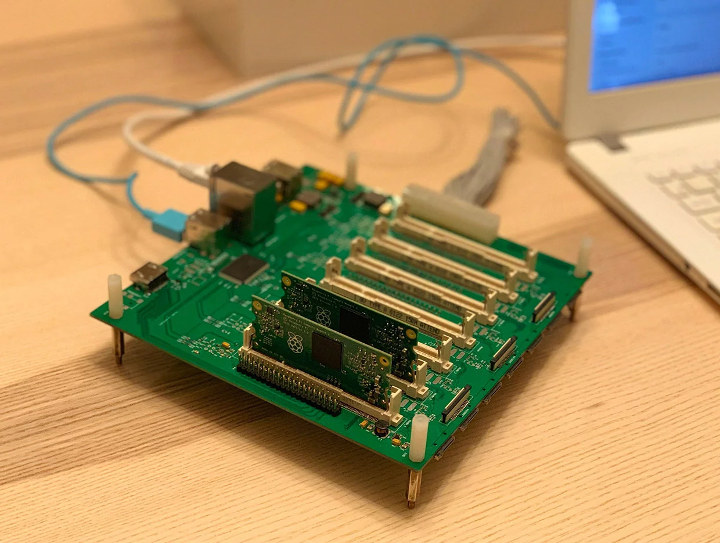Earlier this year, Techbase introduced the ClusBerry 9500-CM4 cluster system for industrial IoT that can take up to eight Raspberry Pi Compute Modules 4 housed in a DIN rail enclosure. But for smaller projects and IoT prototyping, the company has now designed ClusBerry-2M, a smaller cluster device including two independent ModBerry I/O mainboards and two Compute Module 4’s that’s equivalent to two ModBerry 500-CM4, but with support for software cluster management tools such as Docker and K3s Lightweight Kubernetes. The company did not share the full ClusBerry-2M specifications, but we can derive most of the features from the photos, previous products features, and the announcement: SoM – 2x Raspberry Pi Compute Module 4 with Broadcom BCM2711 quad-core Cortex-A72 processor @ 1.5 GHz, 1 to 8GB RAM, up to 32GB eMMC flash. Storage – 2x M.2 slots for NVMe SSDs Video Output – 2x HDMI 2.0 ports Connectivity 4x Gigabit Ethernet […]
Software configuration tips for Raspberry Pi clusters & parallel-ssh command
I missed that linux.conf.au 2021 took place on January 23-25 2021, and while browsing the schedule I noticed a talk entitled “Building Raspberry Pi Supercomputers” by Federico Lucifredi, Product Management Director for Ceph Storage at Red Hat. In the talk, he mostly focuses on the software part, and besides some basic steps, I learned about some new commands that be useful to people managing clusters of Raspberry Pi or other Linux boards or hosts. Configuring a cluster He used Picocluster image in his example, but for people wanting to use 64-bit OS, he recommends Ubuntu or Fedora images until Raspberry Pi OS 64-bit becomes stable. The first part of the configuration is making sure all the main user is the same on all board, disable SSH for root, and configure run levels (X not needed on clusters). Networking is configured with fixed IP addresses for Ethernet, and DHCP for WiFi. […]
ClusBerry 9500-CM4 – A Raspberry Pi CM4 cluster, industrial style
Raspberry Pi cluster boards / solutions pop-up from time to time. But so far, I think we’ve seen only one based on Raspberry Pi CM4 modules with the upcoming Turing Pi 2 mini-ITX cluster board supporting four of those. TECHBASE has now unveiled a different kind of Raspberry Pi CM4 cluster with ClusBerry 9500-CM4 integrating up to eight Raspberry Pi Computer Module 4 in a DIN-Rail housing for industrial applications. ClusBerry 9500-CM4 is designed to be customizable with a choice of Raspberry Pi CM4 based modules and I/O cards: Standard 9500-CM4 cluster module with Compute Module 4 and a selection of configuration that include: I/O Controller with DI, DO, AI, 1-Wire, RS-232/485 and CAN interfaces Communication Gateway with up to 2x Ethernet, serial ports, wireless connectivity: LTE-cat.M1, 4G, 5G, LoRa, ZigBee, Z-Wave, Wireless M-Bus AI Gateway with Coral Edge TPU via PCIe M.2, or up to 4x Coral Edge TPU […]
Jetson Mate Cluster box takes four Jetson Nano/Xavier NX modules
While we’ve seen plenty of cluster boards based on Raspberry Pi SBC or Compute Modules, I had never seen clusters of Jetson modules. Those already exist, and PicoCluster has a few, but what made me write this post today is Seeed Studio’s Jetson Mate cluster box equipped with a carrier board taking up to four NVIDIA Jetson Nano or Xavier NX modules, an enclosure covered with a largish cooling fan with RGB LED for good effect… Jetson Mate specifications: SoM compatibility – Jetson Nano or Jetson Xavier NX via four SO-DIMM sockets Video Output – HDMI 2.0 Networking Gigabit Ethernet (RJ45) port Microchip KSZ9896CTXC 6-port GigE Managed Switch for internal networking between the modules and to the outside world Camera – 2x MIPI CSI connectors USB – 4x USB 3.0 ports (one per module), 1x USB 2.0 port, 1x USB-C port for power Debugging – UART debug pins (4x pairs, […]
ClusterCTRL Stack Helps You Power and Cool up to 5 Raspberry Pi SBC’s
Building a small cluster of Raspberry Pi boards or/and other compact single board computers requires you to handle power and cooling issues, as it may not be practical to have one power supply per board, and since boards are close to each other heat may build up. There are already off-the-shelf solutions such as rackmounts for Raspberry Pi SBCs or carrier boards for multiple Raspberry Pi Compute Modules but more often they do take not take care of all issues like mounting, power, and cooling. ClusterCTRL Stack offers a solution that can power up to 5 Raspberry Pi SBC’s via a 12V/24V power supply and control up to two fans. If you could also 3D print an enclosure for your cluster in order to attach the fan. ClusterCTRL Stack is comprised of two boards with the following key features and specifications: Controller Board Power Input – 12-24V PSU. Power Output […]
CloverPI Clusters Up to 4 Raspberry Pi Boards (Crowdfunding)
We’ve seen Raspberry Pi cluster boards before, and most of them either use Raspberry Pi Zero boards or Raspberry Pi Compute Modules. Some examples include Turing Pi Clusterboard for up to 7 RPi CM3 modules, Cluster HAT board taking up to 4 Pi Zero board, and Mininodes Raspberry Pi 3 COM Carrier Board. But some other solutions like Bitscope rely instead on full-sized Raspberry Pi 2/3/4 Model B boards. Another such option is IPTerra CloverPI board allowing up to 4 Raspberry Pi or compatible boards with 40-pin header to be clustered into a single unit powered by one power supply and connected via a 5-port Gigabit Ethernet switch. CloverPI is shown above without RPi boards. The mainboard includes four 40-pin headers, four 6-pin Ethernet headers for SBC’s, as well as one Gigabit Ethernet port, and one power jack. There’s also a board/card fitted in the middle of the latest version […]
Cluster HAT Interfaces up to 4 Raspberry Pi Zero to Raspberry Pi 2/3/4 Board
Cluster HAT is a solution to the problem of building cluster computing. Distributed computing is difficult already, and this tiny hardware kit is one answer to the problem. Although building a computer cluster is not that easy, it is one of the most impressive Raspberry Pi projects. Why Cluster HAT? The Cluster HAT (Hardware Attached on Top) interfaces a (Controller) Raspberry Pi A+/B+/2/3/4 with 4 Raspberry Pi Zeros. It is configured to use USB Gadget mode. Also, it is an ideal tool for teaching, testing or simulating small scale clusters. Cluster HAT leverages the flexibility of Raspberry Pi by allowing programmers to experiment with cluster computing. It is important you know that the HAT does not come with a Raspberry Pi or Pi Zero. The two are purchased separately. Pimoroni, the manufacturer, provides assembly and control instructions on its product page. Also, they explain 3 ways of setting up the […]
Turing Pi Clusterboard Takes up to 7 Raspberry Pi Compute Modules
We’ve already covered several cluster solutions based on Raspberry Pi boards such as Bitscope Blade with up to 40 Raspberry Pi boards, a 16 Raspberry Pi Zero cluster board prototype, Circumference “datacenter-in-a-box” with up to 32 Raspberry Pi 3 B+ boards. If you want something more compact, it makes sense to develop a platform with Raspberry Pi Compute Modules instead, and we’ve already published news about MiniNodes Raspberry Pi 3 CoM Carrier Board that supports up to to 5 Compute Modules 3/3+ last year. There’s now another option with Turing Pi Clusterboard support up to 7 Compute Modules for applications leveraging Kubernetes, Docker, Jupyter Notebook, machine learning (TensorFlow/Caffe), and serverless stack. Turing Pi specifications: 7x Sockets for Raspberry Pi Compute Module 3/3+ Storage – 7x microSD card slots Video Output – 1x HDMI port, MIPI DSI connector Audio – 1x 3.5mm audio jack Camera I/F – 2x MIPI CSI connectors […]


